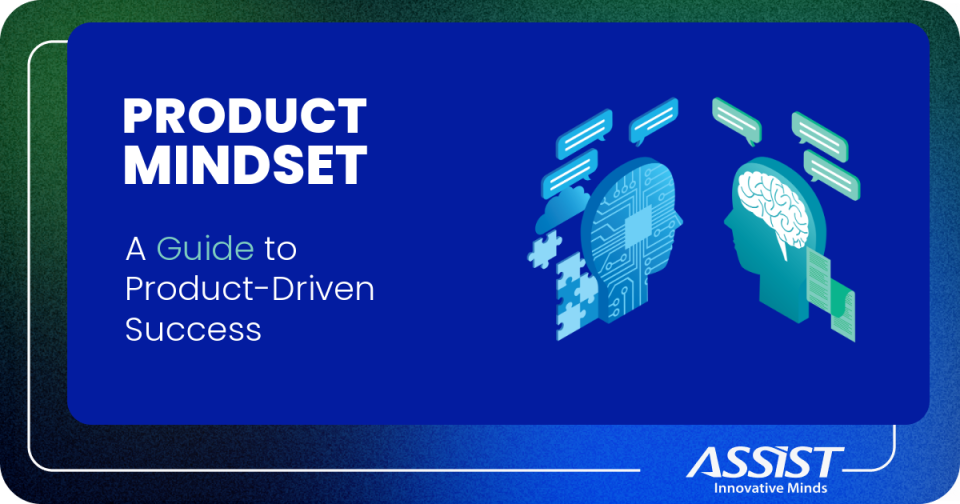Read time: 4 minutes
- Meet our Innovative Minds: Maria Meheden
- Maria's insights into the Microsoft Technologies landscape
- 1️⃣ What frameworks or libraries do you consider to effectively and quickly deliver solutions based on a Microsoft Tech stack?
- 2️⃣ What recent advancements in the Microsoft ecosystem have stood out to you the most?
- Do you use AI tools? How do you integrate them into your projects?
- 4️⃣ What skills do you believe are indispensable for backend developers using Microsoft tools to remain at the forefront of innovation?
- 5️⃣ With the increasing popularity of low-code/no-code solutions, what does the future hold for .NET developers?
Meet our Innovative Minds: Maria Meheden
We're excited to introduce a new series that shines a light on the amazing people who make innovation happen at ASSIST Software. Our team is made up of highly skilled professionals who truly understand their fields and stay at the forefront of tech advances. In this series, we'll highlight their professionalism, expertise, and the value they bring to our projects.
 First up is Maria Meheden, the Deputy of our Microsoft Technologies department. Maria has been with us for eight years, and her deep knowledge of the Microsoft ecosystem makes her an essential part of our team. Among us, she's known for developing and implementing solutions that meet clients' needs and exceed their expectations.
First up is Maria Meheden, the Deputy of our Microsoft Technologies department. Maria has been with us for eight years, and her deep knowledge of the Microsoft ecosystem makes her an essential part of our team. Among us, she's known for developing and implementing solutions that meet clients' needs and exceed their expectations.
What sets Maria apart is her mix of technical skills and client focus. She takes the time to understand what clients really need, building strong relationships that lead to impactful software solutions. Also, Maria is a big supporter of collaboration and communication. She thinks that the most successful projects are born from teamwork, and she creates an environment where every team member feels supported and motivated to contribute.
Don't miss our interview with Maria as she delves into her perspectives and insights on Microsoft Technologies.
Maria's insights into the Microsoft Technologies landscape
In the following interview, Maria shares her insights into the fast-evolving landscape of Microsoft Technologies, the role of Artificial Intelligence in the current software development industry, and the importance of building solid teams. We believe her perspectives will be valuable to both technical professionals and those interested in understanding the broader impact of technology on our work and future. Let's delve into the interview!
1️⃣ What frameworks or libraries do you consider to effectively and quickly deliver solutions based on a Microsoft Tech stack?
In my experience, using existing tools and services at every level is the best way to deliver an end-to-end solution efficiently. For example, you can use Blazor for web-based UIs, MAUI for mobile and native UIs, and .NET for the backend. You can host everything in the Azure cloud and connect with Azure Synapse and Power BI for business analytics.
2️⃣ What recent advancements in the Microsoft ecosystem have stood out to you the most?
One of the advancements that stood out to me was .NET MAUI (Multi-platform App UI). This framework helped our team create both web & mobile apps using the same codebase and streamlined cross-platform development. I have also witnessed Blazor mature into a powerful tool, which our team used to build robust interactive web UIs.
3️⃣ Do you use AI tools? How do you integrate them into your projects?
Yes, we use Azure AI Services, including Vision, Language & Speech, Azure ML, and Synapse Analytics, to bring AI capabilities like image recognition, natural language processing, and predictive analytics into our work. AI is a core part of the Microsoft ecosystem we engage with, spanning from Office 365 to Azure Copilot and Power BI.
We’ve also explored tools like Azure OpenAI Service, ML.NET, and Azure Semantic Kernel.
4️⃣ What skills do you believe are indispensable for backend developers using Microsoft tools to remain at the forefront of innovation?
The Microsoft ecosystem is evolving, and new AI tools and skills are popping up regularly. Thus, it's essential for me and my team to keep learning and to stay updated. Thanks to the variety of tools and services available, there are countless ways to tackle a problem. I've found that quickly setting up what I need in Azure, testing out different solutions, and picking the best one is a valuable skill.
5️⃣ With the increasing popularity of low-code/no-code solutions, what does the future hold for .NET developers?
I closely follow tech trends and am intrigued by the rise of low-code/no-code solutions. Tools like Azure Data Factory allow users to create virtually no-code ETL pipelines. Microsoft Power Platform offers a low-code/no-code approach to workflow automation, data analytics, and more. I believe these tools are excellent for handling simple tasks and are user-friendly for those without a tech background. Of course, for bespoke solutions, there's no substitute for professional software engineers.
We hope you enjoyed this conversation with Maria as much as we did. In the future editions of "Tech Insights from Innovative Minds," we will introduce more colleagues who are making a difference through their expertise. We will feature a new interview each month, providing fresh insights and perspectives on the latest trends and technologies. Stay tuned!






